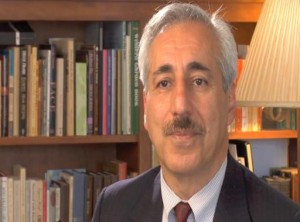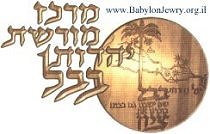Joe Shamash
“I remember camels coming up to our front door with huge sacks of salt,” says Joseph Shamash. Vendors would come in through the high walls of his family’s home just two blocks away from the King’s Palace in Baghdad.
“They would bring cows to the front door also,” he says. “We would choose the cow and they would milk the cow into a pail. Then we would boil the milk and separate it from the cream.”
Having grown up in Iraq in the early fifties, Shamash is still amazed by how primitive and wonderful life could be. While he does remember some bad times, what is most vivid are days spent floating down on the Tigris on palm fronds, eating fish and riding taxis that were still horse drawn buggies.
“I suspect our family history goes as far back as when the Jews were brought over to Babylon,” he says. Shamash was born in 1948, the second of seven children.
His father, Selim Shamash was a successful merchant, trading textiles among other products. Selim traveled around the world. Business took him as far as India and China, which Shamash says was rare for Iraqi’s.
As a child, Shamash, always knew that being Jewish was dangerous and something to be wary about sharing with strangers. His parents had told him stories of the Farhoud’s in the years before we he was born. During WWII Shamash’s father was arrested in Egypt.
“You had to be careful,” Shamash says. But the danger wasn’t acute. His parents allowed him to take the bus to school as a child and walk to the market alone. “One day I was walking back from the market. A young boy asked me if I was Jewish. I felt uncomfortable. He was confrontational and I knew it was very sensitive to get confronted in that way.”
Instead of answering, Shamash turned and headed home. The other boy threw a stick with a nail in it, which struck Shamash in the head causing him to bleed. When he showed up at home, bloodied, his mother began screaming.
Another incident occurred while leaving a country club frequented by mostly Jews and some Christians; a group of Muslims chased the car Shamash was in throwing stones.
Despite occasional incidents life was good until his family was forced to leave in 1957, Shamash says. “When life was good it was great and when it was bad it was terrible.
After the king was assassinated Shamash’s parents knew to leave. They were able to get some money out. But had to pay huge bribes that amounted to half of what they were trying to take out of Iraq. All but Shamash’s eldest brother Albert left for Queens New York.
In 1958 Shamash’s parents traveled back to Iraq to get Albert. But the authorities would not let them leave for two years, leaving Shamash and his five stateside siblings alone.
“It took a long time to feel at home,” Shamash says. “The culture in America was so different. The same hospitality was not there. People were polite, but not intimate.” He missed the warmth and closeness he had felt in Iraq.
He also found the level of education far below the standards he had grown accustomed to in Iraq. In Baghdad, he was studying Hebrew, English and French on top of the Arabic that was spoken in school. He also says the education in mathematics was far superior. “It took me three years to get back to the same level in math that I was learning before I left Iraq.”
But over the years he adapted to American culture. Shamash has traveled to over 30 countries in his life and says that being Jewish helped him adapt to America.
“I was in China,” he says. “One of the Chinese people I met said that the Chinese are the Jews of Asia because they survive wherever they go.”
Shamash’s three children, while American, have developed an affinity for the Iraqi way of doing things, he says. “I think they find it a more festive and liberated lifestyle. It’s more anarchist than the European lifestyle.”
He is happy that his children still have a link with their Iraqi heritage. And while he can’t be sure about the next generation that the culture he knew as a child has past down one generation is encouraging.
Joseph Shamash lives in Orinda with his wife and two children. His eldest daughter is studying at USC.




